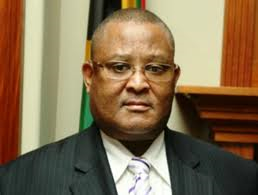KP Chair Calls on US to Lift Sanctions on Zimbabwe Diamond Mines
November 20, 13
 |
Nhlapo, speaking at the KP’s Plenary Meeting in Johannesburg, congratulated the EU for its decision in September to lift sanctions following Zimbabwe’s July 31 elections won by President Robert Mugabe.
"We hope that those who continue to maintain such sanctions will also be able to lift them because the lifting of these sanctions would assist Zimbabwe to bring stability and prosperity once again," he said at the start of the KP’s four-day meeting.
The EU lifted restrictions against the Zimbabwe Mining Development Corporation (ZMDC), the firm that controls the Marange diamond fields.
Zimbabwe's Mines Minister Walter Chidakwa also called on the United States to follow the EU’s lead. The move by the EU allows the country to go back to trading in Antwerp.
"I hope that in December we will be able to make a full comeback into Antwerp," Chidakwa told AFP.
The United States blacklisted the ZMDC for allegedly channeling funds to Mugabe's ZANU-PF party.
The 81 members of the KP are discussing the work of the body amid calls for reforms. "There are still ... several challenges we need to deal with," said Shamiso Mtisi, representing civil society in the Kimberley Process.
The internecine conflict in the Central African Republic was among the issues to be discussed. The country was suspended from the KP earlier this year after rebels staged a coup.
Mtisi also raised concern about human rights violations in Angola that is aiming to be vice chair of the KP in2014.
The KP is also due to review the status of the Ivory Coast and Venezuela. The former is under a UN diamond embargo imposed in 2005, while Venezuela voluntarily pulled out of the KP in 2008 amid accusations of failing to respect the KP's rules.
There are also calls for reforms, particularly a re-definition of the term ‘blood diamond’, which Partnership Africa Canada researcher Alan Martin, said has become "very outdated".
World Diamond Council President Avi Paz said the WDC "supports the process of reform “including the expansion of its mission to include systematic acts of violence against communities that are directly associated with diamonds, although not necessarily within the context of civil war".
However, Nhlapo, and many African and other states, fear that expanding the responsibility of the KP would threaten "its very credibility and existence".
"The KP was not created to end conflict, or to end human rights abuses or to take retributive action against sovereign states," he said.